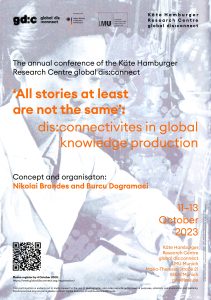11-13 October, gd:c annual conference
 ‘All stories at least are not the same’: dis:connectivities in global knowledge production
‘All stories at least are not the same’: dis:connectivities in global knowledge production
The creation, provision and application of knowledge depends on subjects, geographies, events and wider contexts. ‘All stories at least are not the same’, noted the writer Bernadette Meyer in 1968 in her volume Story, in which various novellas intertwine. Taking stories as diverse and non-hierarchical forms of producing and transferring knowledge, Meyer’s statement could be adapted as follows: knowledge as the totality of one’s abilities moves and is moved — between continents, regions, countries and societal contexts. Educational institutions, publishing houses, companies and state institutions, as well as social groups and individuals, organise and archive knowledge stocks, and they translate, convey and re-contextualise them in (global) transfers. These processes cannot be reduced to a linear narrative of boundless, irrevocable epistemic globalisation of permanently increased interconnectedness and universal availability. Rather, transnational and transcultural knowledge production is articulated precisely in dissonant registers as, for example, through interruption, absence and digression.
Not least due to the Covid-19 pandemic and the realignment of geopolitical blocs, political think tanks, editorials and other opinion leaders have recently postulated increasing ‘deglobalisation’. However, instances of dis:connectivity that emerge through various forms of interruption, absence and detours can also be understood as foundational dynamics of historical and contemporary globalisation. Dis:connectivity means the coexistence of non-connection and connection as, for example, in constellations of local and global knowledge and of traditional/indigenous and futuristic/technological knowledge production. Our perspective on dis:connectivity thus necessarily includes hierarchies, power relations and inherent norms of global knowledge circulation.
The dis:connective conditions of global knowledge production are the starting point of our centre’s second annual conference, which is divided into three sessions — unlocking knowledge, bodies of knowledge and challeging knowledge — with visits to Munich museums and cinema.
Organisers:
Nikolai Brandes and Burcu Dogramaci
Venues:
Käte Hamburger Research Centre global dis:connect, Maria-Theresia-Str. 21 81675 Munich
Arena Kino, Hans-Sachs-Str. 7 80469 Munich
Haus der Kunst, Prinzregentenstr. 1 80538 Munich
Stadtmuseum, Sankt-Jakobs-Platz 1 80331 Munich
Please register by 4 October HERE.
Please click HERE to download the programme and HERE for the conference report by Dogukan Akbas and Peter Seeland.





